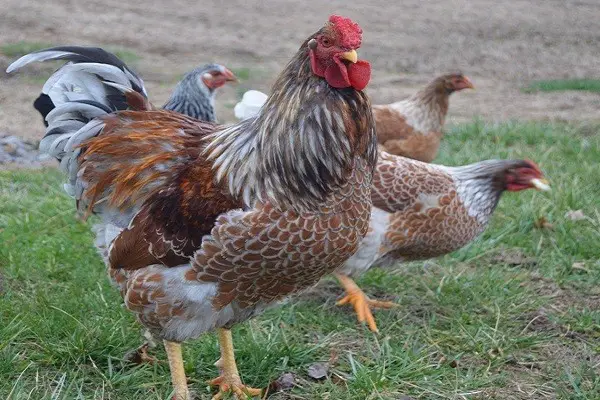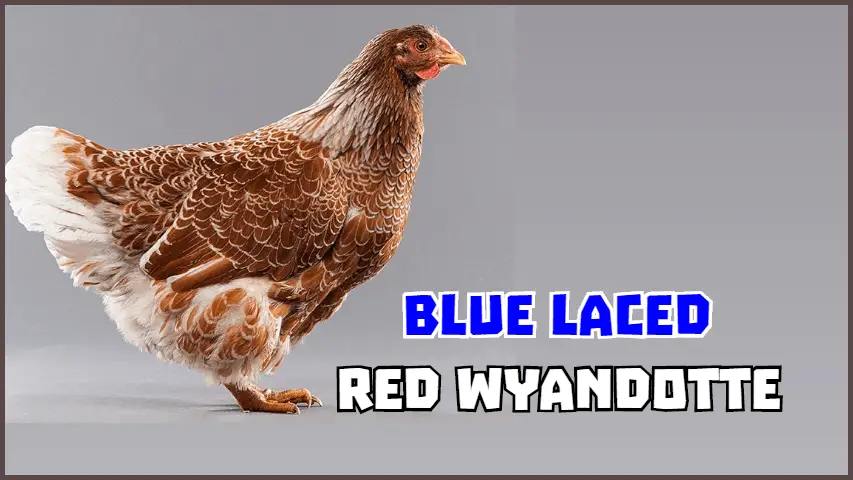When it comes to a beautiful, popular and sought after chicken type, you are going to go a long way to find one as delightful as that of the Wyandotte Chickens. They are a firm favorite of chicken farmers and owners just because they are so dependable in their egg laying.
They also have laid back and easier going natures, they are hardy, beautiful to look at too with all their rainbow of colors. It’s no wonder you find names such as Golden Laced, Silver Penciled, and Blue Laced Red Wyandotte! Some of these birds are rare as well, and hard to get hold of.
Wyandotte’s originally was created in the USA around 1870. The first ever color was the Silver Laced Wyandotte. All the up and coming future colors of Wyandotte’s were based on the description of the Silver Laced.
Related Article – 15 Most Common Chicken Diseases, Symptoms and Treatment
This bird was meant to be a bird that was dual purpose, i.e. a bird that was able to be both bred for its meat and its eggs. Wherever a new Wyandotte breed was created, the name would be given to the bird from the area it was created.
If for instance, the creator lived in Rhode Island, the bird might be called the Rhode Island Red. The name, Wyandotte, however, originates from an Indian tribe of North America and who once inhabited parts of the Eastern USA.
Heritage Chickens
One of the really popular varieties of the Wyandotte range of birds is the Blue Laced Red Wyandotte – also a rare variety and new in the USA. These birds form part of the Heritage stock and have been sourced from a top show-breeder.
Basically, “A heritage egg from a heritage stock such as the Wyandotte’s can only produced from an APAS – American Poultry Association Standard breed. This means a heritage chicken would be hatched from a heritage egg which would have been sired from an American Poultry Association Standard breed which was established before and up to around the mid-20th-century. This type of heritage chicken is slow growing, i.e. natural growing, naturally mated and which has had a natural and long productive outdoor life” – in other words, chickens much like our forefathers of old used to farm with.

Those chickens that are marketed as Heritage chickens need to include their various types and breed names on the label. The Blue Laced Red’s feathers are smoky blue and edged in red, certainly noticeable in the backyard.
It is known that a Blue Laced fowl hatches out 50% blue laced chickens, 25% splash-laced and 25% black-laced. This is due to the genetics of this beautiful blue color, but you can be assured that every color is beautiful!
As with all Wyandotte’s and that includes the Blue Laced Red, they have a heavy-type body with a small rose comb. This makes them good birds for the colder climates because they do not get affected by frostbite.
This also makes them hardy and energetic, and of course always faithful in their egg-laying. Males weigh about 8½lbs and the females about 6lbs.The Blue Laced Red Wyandotte bantam will weigh about 3-3¾ lbs.
How Did The Blue Laced Red Come About?
The gorgeous Blue Laced Red Wyandotte came about; created way back in the 1800s when a gentleman known as Mr. Heidenbluth from Frankenburg Saxony decided to cross the Gold Wyandotte which no longer exists, with the Andalusian Blue Wyandotte.
By the time 1929 came around, there were over hundred birds that were being shown at the annual Leipzig show. After that, the breed spread to England and from there over to the USA.
The ‘red-color’ in the name is not actually bright red, but more a caramel color; deep mahogany, which is outlined by a blue-grayish edging.
From the genetics of the Andalusian Blue back in the 1800s, today’s Blue Laced Reds have three colors. They are a dark blue charcoal color, blue with a splash of very light blue to white as well.
The skin and feet of this bird are yellow. They have horn-colored beaks and bay-colored eyes.
The color genetics of the Blue Laced Red Wyandotte chicks for instance work as follows:
- Blue x Blue – 50% Blue, 25% Black, 25% Splash
- Blue x Splash – 50% Blue, 50% Splash
- Blue x Black – 50% Blue, 50% Black
- arrow-rightSplash x Black – 100% Blue
- arrow-rightBlack x Black – 100% Black
- arrow-rightSplash x Splash – 100% Splash
Today, the Blue Laced Red chickens are not an accepted color for Wyandotte’s yet, but there is a Certificate of Development which means these birds can be shown off at exhibitions.
Because the Blue Laced Red is a co-dominant gene, the blue-lacing won’t breed true. Which means if you were to breed two blues as mentioned above, you would get the different color definitions.
Do You Want Some Blue Laced Reds? Know What You Are Getting With The Wyandotte’s
- One thing about the Wyandotte’s is that they are excellent egg layers; you can expect to get around 200 eggs every year from your Blue Laced Red Wyandotte hens. Not only are they beautiful birds, but their eggs are healthy and lovely to look at too, light to rich brown in color.
- Although they are a big chicken breed, they are adaptable chickens and can manage on less land than some of the other larger breeds. It must be said though that the Wyandotte prefers to range.
- The Wyandotte’s, once again, are beautiful, and their feathers aren’t tight on their bodies, but loose, which makes them look lovely and fluffy and healthy. But this also helps the Wyandotte in dealing with the cooler climates. Their personalities are strong and friendly, making them a good chicken breed if you are just starting out with chickens. It’s because they are steady layers, they are docile, they are very pretty and companionable, their non-feathered legs make them easier to keep clean and they are good foragers.
- A Wyandotte is a sociable and companionable bird and they love “talking” and cackling with each other. Remember that if you do not live in such a rural area but in an urban area. You need to bear in mind that your neighbors might not put up with all the noise and clucking. Sad, but true.
- Remember you should not buy Wyandotte’s and that includes the Blue Laced Red Wyandotte chickens, if you are looking for a pet, a cuddly fluffy pet in a small space.
- The Blue Laced Red Wyandotte hens are good mothers, even incubating eggs from other hens.
Where Do You Get Your Blue Laced Red Wyandotte From?
It goes without saying that you need to purchase your Wyandotte’s from a reputable chicken breeder. Sometimes in advertisements, you will see Blue Laced Red Wyandotte chicks advertised as just that, when in fact they might well just be hybrids.
This means if you are searching for chickens that are true to their breed, you need to find a true breeder, a passionate Wyandotte lover, where you can see good and healthy birds.
Your best bet is to contact breeders in the country where you live and if you live outside a country like the USA, it is best to search in good poultry/chicken magazines for breeders of true Blue Laced Red Wyandotte chicks in your area.
Coming Home To Roost
If your Wyandotte’s are going to be free-ranging, they will still get to know their coop after about a week of being “locked” in the coop. After their week of “knowing” their coop, they will love free-ranging but will come home to roost each night.
They will know their safe home. If you keep your Wyandotte’s well fed, well watered, coop well-cleaned, within a few months you will find your first egg which will be the most exciting thing!
A chicken on average will start laying at around 6-months old but of course, this can depend on their breed, the time of the season and other things.
Remember, spoiled chickens lay better eggs! Well, that’s your Wyandotte’s.
DON’T MISS
- 10 Homemade Chicken Pluckers – Easy to Build (100% Free)
- 10 Free Chicken Run Plans & Ideas That Are Easy to Build (100% Free)
- 10 Pallet Chicken Coop Plans and Ideas
Last Updated on January 14, 2025 by Pauline G. Carter

